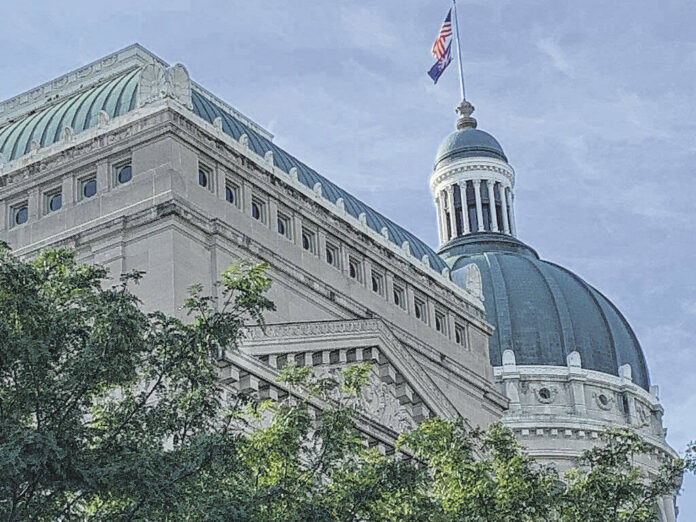The latest campaign filings filtered in last week, showing which races and candidates are having the most fundraising success as well as which state senators and representatives are struggling to attract voters.
Republican Secretary of State candidate Diego Morales has weathered several controversies during his campaign, but still emerged from the third fundraising quarter with nearly $482,000 cash on hand, raising just under $311,000. One notable expenditure was $377 on an inflatable bounce house at a July fundraiser.
His Democrat opponent, Destiny Scott Wells, outperformed Morales in fundraising slightly, bringing in more than $328,000 during that period. Her campaign reported having $299,000 cash on hand at the end of the quarter.
But Wells’ campaign does have a small debt to the candidate–$5,547 leftover from January expenses Wells herself paid during the campaign’s launch.
The Indiana Republican Party raised $3.1 million and ended the period with $256,922 cash on hand compared to the Democrats raising $1.8 million and ending with $507,655.
Spending in the House
The House Republican Campaign Committee, or HRCC, contributed to dozens of campaigns around the state, but several candidates reaped far more than others.
The largest sum of money from the HRCC went to Julie McGuire, who received over $532,000 in her bid for District 93.
McGuire beat out former Rep. John Jacob in May’s Republican primary and most of the HRCC’s contributions to her predate the latest filing. But between April and October, the period covered by this report, McGuire received $42,500.
Other recipients include incumbent Julie Olthoff, of northwestern Indiana, who received a paltry $5,000 in August followed by $100,000 in late September for a total of $105,000.
The House Republican Campaign Committee and Senate Majority Campaign Committee split the cost of a statewide poll on abortion in late July—just before the legislative special session. The total cost was about $49,000.
Other recipients, including Rep. Dale DeVon of Granger, received all of their funding in recent months. DeVon received $40,000 in late September and another $50,000 in mid-October.
The HRCC also gave big to candidates challenging incumbent Democrats, as seen in the race of Kyle Pierce. Pierce is challenging Anderson Rep. Terri Austin and received $95,000 from the HRCC in two separate installments: $10,000 in August and $85,000 in September.
For some recipients, the April to October period covered by the report reflected some last minute cash infusions for candidates before the May primary.
Rep. Craig Snow and Rep. Curt Nisly were redrawn into the same district following redistricting, with Snow earning the leadership’s nod and getting $165,000 from the HRCC, including $80,000 in early April. Snow won the primary and is likely to win his northern Indiana seat.
But not all high-dollar recipients will return to the Statehouse in January. Rep. Dan Leonard lost his northeastern seat in the May Republican primary to rightwing candidate Lorissa Sweet. Leonard received $175,000 total from HRCC, including a late April contribution of $60,000 just before the primary.
The HRCC ended the six-month filing period with $2,178,915 cash on hand.
The Indiana House Democratic Caucus made just two candidate contributions in the latest report: $11,000 to Indianapolis Rep. Mitch Gore and $10,000 to Jeffersonville Rep. Rita Fleming. The committee has $624,162 cash on hand.
Big spending in the Senate
On the Senate side, the Senate Majority Campaign Committee, or SMCC, has paid for survey research in six districts across the state, including: Senate Districts 1, 4, 11, 26, 29 and 31.
Senate District 31, currently held by embattled Republican Kyle Walker, is one of the most high-profile state senate races for Hoosiers and likely to be one of the closest elections in November.
Walker faces a challenge from Democrat Jocelyn Vare, a former Fishers city council member, in the central Indiana district. The SMCC has given nearly $400,000 to his election committee, far more than any other candidate, and polled his district twice with two different firms.
Senate District 26, a new district in Muncie formed during redistricting with no incumbent, pits Democrat Melanie Wright, a former state representative, against Republican Scott Alexander, a Delaware County commissioner. SMCC paid for two rounds of survey research in this district, both from the New York-based Mclaughlin & Associates.
Districts 1 and 4, both in northwestern Indiana, have incumbent Democratic candidates facing Republican challengers: Michael W. Griffin, the incumbent, versus Daniel E. Dernulc; and Rodney Pol, Jr., the incumbent, versus Jeff Larson.
The final Democratic district surveyed by SMCC–District 29–is held by Sen. J.D. Ford who faces a challenge from Republican Alex Choi.
The SMCC also funded a survey in District 11, held by Republican Sen. Linda Rogers, whose district hugs the Michigan border near Granger. She faces Melinda (Mindy) Fountain, a Democrat.
The Republican committee ended the quarter with $966,762 cash on hand while their Democrat counterparts, who did not directly fund State Senate candidates, ended with $104,221.
This story by Whitney Downard is republished from The Indiana Capital Chronicle, an independent, nonprofit news organization that covers state government, policy and elections.





